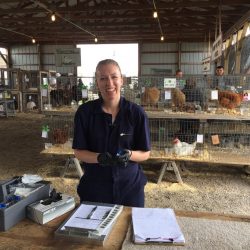Dr. Andrew Clark, Michigan State University DVM Class of 1964, is working on a disease control platform to lessen hunger, infection, and unrest while increasing food security in Africa—and across the globe.
Every five years, the African Union Commission meets to write a declaration that discusses policies and issues that need to be addressed. At the 2014 African Union Summit in Malabo, Equatorial Guinea, two key points were raised. In order for Africa to keep up with population growth, agricultural production (including livestock) must double and trade must triple by the year 2025; the United Nations projects that by 2100—in 82 years—Africa’s population will have grown to nearly 4 times its size and the continent will hold 39 percent of the global population.
The Africa that is experiencing issues of food insecurity today needs change for tomorrow. That is according to Dr. Andrew Clark, international veterinary disease control specialist and alumnus from the Michigan State University College of Veterinary Medicine. To address Africa’s future food requirements, Clark is advocating for his Standard Methods and Procedures in Animal Health (SMP-AH) disease control platform.
“The SMP is modeled after what we do here in the States,” says Clark. “East Africa is a hotbed for livestock disease, and controlling trade-sensitive Transboundary Animal Diseases (TADs) lubricates trade by increasing confidence in animal health control between nations, both importing and exporting.”
It has already proven successful. In 2012, the SMP-AH approach was deployed in Eastern Africa as a USAID-funded project implemented by the African Union–Interafrican Bureau for Animal Resources (AU-IBAR). It has worked well in Kenya, Tanzania, Uganda, Djibouti, Eritrea, Ethiopia, and Somalia – but less so in South Sudan due to conflict. TADs do not respect international boundaries, but with improved capabilities for surveillance, epidemiology, diagnostics, and enhanced cross-border cooperation, disease control has been improved for the region’s 350 million head of camels, cattle, goats, and sheep.
“The SMP approach mirrors our system,” says Clark. “Major diseases of zoonotic and trade sensitive importance are controlled in our 50 states by the state veterinarians in concert with the USDA’s State-Federal Cooperative Disease Control Programs. We transposed this system to Africa. AU-IBAR has done excellent work to create control programs for each disease of interest and to coordinate with chief veterinary officers of each nation. Results have been good with significantly better cooperative work.”
Completed project activities include SMPs for 9 TADs across 7 countries, distribution of “A Field Manual of Animal Diseases by Syndrome” to grassroots stakeholders, vaccination campaigns, laboratory technician training and diagnostic resource updating, quarantine training, and an inter-regional conferences to promote safe and stable trade, among other initiatives.
“I’m proud of what we accomplished, but there’s more to do,” says Clark.
The vision is to use SMP to connect all of sub-Saharan Africa—the Eastern, Central, Western, and Southern regions—on the same disease control platform to facilitate the trade of the 2 billion head of livestock in the 46 nations south of the Sahara desert.
“With this system, you solve more than just food instability,” says Clark. “The livestock value chain is long and deep. Millions of jobs are tied to it—daily care of livestock, vaccine and pharmaceutical production and use, veterinarians, traders, marketers, transporters, butchers, the many uses of animal by-products—and if the health of livestock is stabilized, the livelihoods of millions of people are stabilized. People can start to see a future instead of a gray wall about three days out. They feel secure, and we can start to reduce conflict.”
“I’m proud of what we accomplished, but there’s more to do."
Animal health and human happiness aren’t the only factors SMP could impact. Many livestock diseases are zoonotic, meaning they’re transmittable from animals to humans. Controlling disease helps prevent epidemics, pandemics, and even bioterrorism.
“There’s a strong humanitarian component to SMP,” says Clark. “But whether or not you feel compelled to help the people of Africa, you should care about these diseases because if they are not controlled, we all could be at risk one day. The enormous amount of international and intercontinental trade in agricultural commodities that takes place daily, including livestock products, has potential for transporting pests and pathogens along with those products, and these threaten our own agricultural and livestock industries. Keeping those diseases “at home” and assisting with controlling them there makes good economic and policy sense. Additionally, in the case of zoonotics, more than 1.13 million humans travel by air daily and the potential for spread of virulent diseases is enormous. Our foreign assistance funding is well used for disease control in both human and animal populations.”
Clark knows too well the risk that zoonotic diseases can pose to humans. In 2007, Highly Pathogenic Avian Influenza (HPAI) ran rampant in Egypt. He worked as the HPAI Specialist for the USDA Animal and Plant Health Inspection Service-International Services, but not before the disease killed tens of millions of chickens and established a 63 percent case fatality rate in humans. Working with Egyptian veterinary colleagues, he developed a “Safe Contained Poultry Slaughter” protocol to protect village women doing home slaughter of chickens against exposure to airborne HPAI virus. This approach became a USAID-funded project implemented by the Food and Agriculture Organization (FAO) of the United Nations in cooperation with the national veterinary department on the livestock side and the Ministry of Health on the human side. The behavior-change outreach program made contact with more than 1.4 million households–an example of “One Health” in action.
“These diseases can ruin lives in more ways than one,” says Clark. “We need to control them for food stability, conflict reduction, and public safety. Approaching disease control using Regional Economic Communities as the basis for coordination and getting all of these countries to use the same principles, applications, surveillance methods, and laboratory diagnostics builds confidence between the nations to facilitate safe and effective trade. Controlling pests and pathogens regionally is much more efficient than a nation-by-nation approach and the SMP approach can be adapted to any agricultural commodity–not just to livestock. It can work for cassava or maize or bananas as well.”
Like most things, SMP-AH requires money. The project in Eastern Africa cost more than $7 million to control TADs in about 350 million head of livestock. But, USAID funding diminished and the project ended in March 2017.
“I’m hopeful that we can continue this important work,” says Clark. “The cost of a program like this pales in comparison to the cost of damage control during and after a serious disease outbreak or epizootic.”
Born and Raised
Clark was never a stranger to Michigan State University or veterinary medicine. His father graduated from the MSU (then Michigan Agricultural College—MAC) College of Veterinary Medicine in 1929 and was a pathologist before becoming a professor; then, head of surgery and medicine at the clinic (now the MSU Veterinary Medical Center) and, eventually, dean for the College. Clark grew up in East Lansing and spent his childhood roaming around the school and clinic, constantly immersed in veterinary medicine. And in 1964, Clark himself graduated with his DVM from the MSU College of Veterinary Medicine.
“It’s in my blood,” says Clark. “My grandfather was a “horse-leech” [archaic term for a veterinarian] in the late 1800s, and my dad, my brother (MSU 1955), and myself are all veterinarians.”
Clark spent two years as a Peace Corps Volunteer in Tanganyika, now Tanzania. “I received that precious DVM on a Saturday in June of 1964, left for a two-year stint with Peace Corps on Sunday, and as a qualified veterinarian, my first job paid $65 per month!” says Clark. He then stayed in East Africa, spending 15 more years in Tanzania and Kenya working as a Veterinary Officer and with agriculture development and food supply stabilization. He moved to Oregon and eventually became the state veterinarian, then, after retirement, dove back into Africa on various projects through USDA Foreign Agricultural Services and several universities. That has been, Clark says, some of his most fulfilling work. He continues to work with several African and Asian development involvements.
“When I’m working on things like the SMP project, I’m dealing with the chief veterinary officers of these nations,” says Clark. “They’re smart and they’re well-educated and they’re skilled veterinarians. They all have DVMs, all of them have master’s degrees, and most of them have PhDs, so generally—with only a DVM—I’m the least educated person in the room when we have meetings!” But, Clark notes, he has deep, long-term experience in Africa working with large population livestock disease control programming. “And that experience can be very useful for forward planning,” he says.
“These diseases can ruin lives in more ways than one. We need to control them for food stability, conflict reduction, and public safety."
“I worked in the early phases of eradicating rinderpest, the worst cattle disease ever known,” Clark continues. “It’s the first veterinary disease to be eradicated worldwide, and in Masailand, we vaccinated about 850,000 cattle annually for several years. It was a huge piece of work in many nations and on several continents, but with a worldwide coordinated effort, it got done. And when I look at things like smallpox eradication on the human side and rinderpest eradication on the veterinary side and the other disease-fighting efforts across the globe, I know we can—and must—continue that good work, including control of livestock diseases in Africa so that high-quality protein can be widely distributed through safe trade from areas of high production to areas of low production. That way, those developing brains of children can be properly nourished.
Stabilized livelihoods and food security are worthy goals. We need to continue to be creative in our approaches, collaborative in our efforts, and we need funding for the programs and projects that make it all happen. This work not only solves problems in the developing world—it also protects our livestock and agricultural industries right here in the United States.”
For more information about the SMP project, contact Dr. Andrew Clark at andrewaclark1940@gmail.com.



